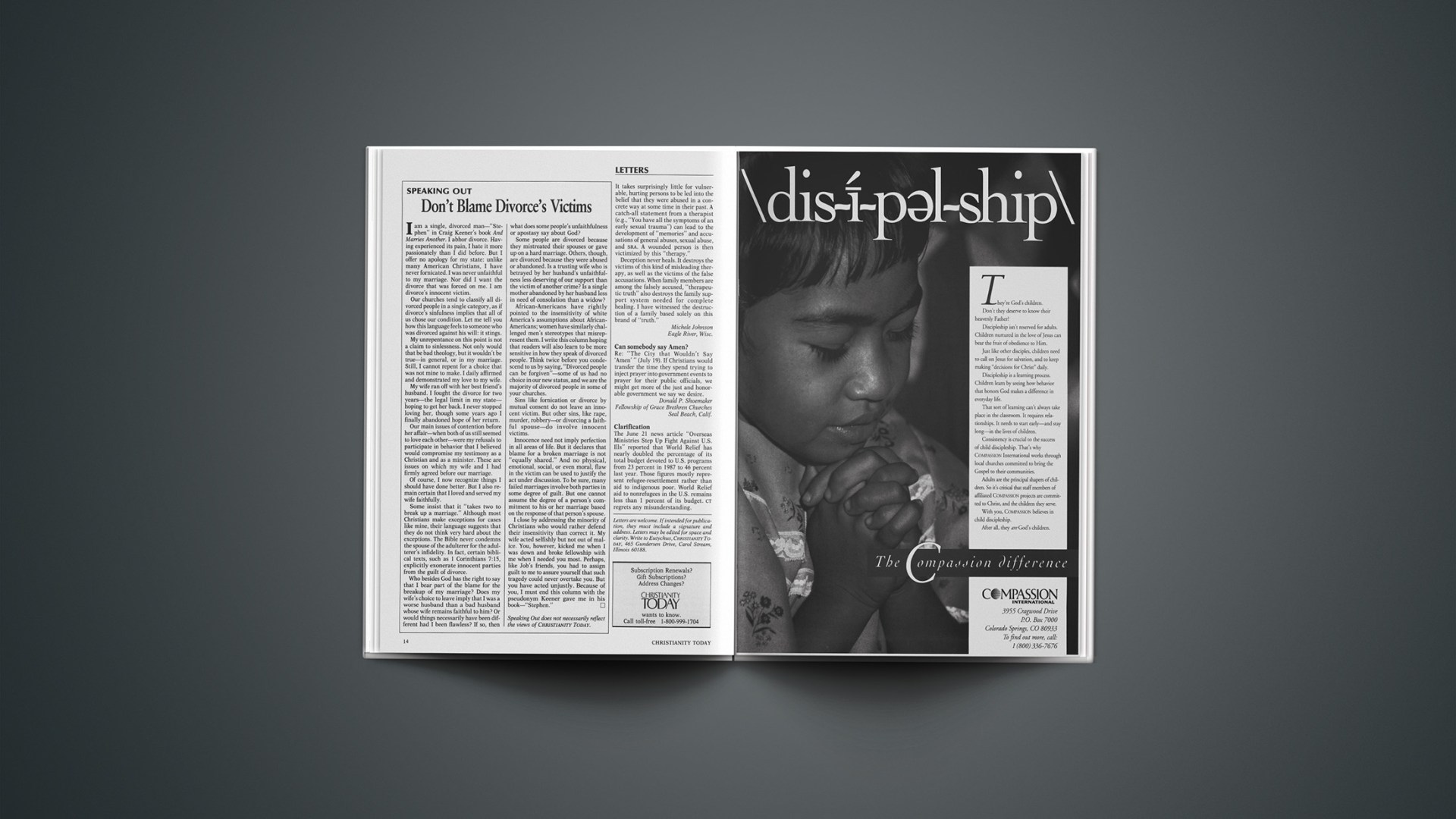I am a single, divorced man—“Stephen” in Craig Keener’s book And Marries Another. I abhor divorce. Having experienced its pain, I hate it more passionately than I did before. But I offer no apology for my state: unlike many American Christians, I have never fornicated. I was never unfaithful to my marriage. Nor did I want the divorce that was forced on me. I am divorce’s innocent victim.
Our churches tend to classify all divorced people in a single category, as if divorce’s sinfulness implies that all of us chose our condition. Let me tell you how this language feels to someone who was divorced against his will: it stings.
My unrepentance on this point is not a claim to sinlessness. Not only would that be bad theology, but it wouldn’t be true—in general, or in my marriage. Still, I cannot repent for a choice that was not mine to make. I daily affirmed and demonstrated my love to my wife.
My wife ran off with her best friend’s husband. I fought the divorce for two years—the legal limit in my state—hoping to get her back. I never stopped loving her, though some years ago I finally abandoned hope of her return.
Our main issues of contention before her affair—when both of us still seemed to love each other—were my refusals to participate in behavior that I believed would compromise my testimony as a Christian and as a minister. These are issues on which my wife and I had firmly agreed before our marriage.
Of course, I now recognize things I should have done better. But I also remain certain that I loved and served my wife faithfully.
Some insist that it “takes two to break up a marriage.” Although most Christians make exceptions for cases like mine, their language suggests that they do not think very hard about the exceptions. The Bible never condemns the spouse of the adulterer for the adulterer’s infidelity. In fact, certain biblical texts, such as 1 Corinthians 7:15, explicitly exonerate innocent parties from the guilt of divorce.
Who besides God has the right to say that I bear part of the blame for the breakup of my marriage? Does my wife’s choice to leave imply that I was a worse husband than a bad husband whose wife remains faithful to him? Or would things necessarily have been different had I been flawless? If so, then what does some people’s unfaithfulness or apostasy say about God?
Some people are divorced because they mistreated their spouses or gave up on a hard marriage. Others, though, are divorced because they were abused or abandoned. Is a trusting wife who is betrayed by her husband’s unfaithfulness less deserving of our support than the victim of another crime? Is a single mother abandoned by her husband less in need of consolation than a widow?
African-Americans have rightly pointed to the insensitivity of white America’s assumptions about African-Americans; women have similarly challenged men’s stereotypes that misrepresent them. I write this column hoping that readers will also learn to be more sensitive in how they speak of divorced people. Think twice before you condescend to us by saying, “Divorced people can be forgiven”—some of us had no choice in our new status, and we are the majority of divorced people in some of your churches.
Sins like fornication or divorce by mutual consent do not leave an innocent victim. But other sins, like rape, murder, robbery—or divorcing a faithful spouse—do involve innocent victims.
Innocence need not imply perfection in all areas of life. But it declares that blame for a broken marriage is not “equally shared.” And no physical, emotional, social, or even moral, flaw in the victim can be used to justify the act under discussion. To be sure, many failed marriages involve both parties in some degree of guilt. But one cannot assume the degree of a person’s commitment to his or her marriage based on the response of that person’s spouse.
I close by addressing the minority of Christians who would rather defend their insensitivity than correct it. My wife acted selfishly but not out of malice. You, however, kicked me when I was down and broke fellowship with me when I needed you most. Perhaps, like Job’s friends, you had to assign guilt to me to assure yourself that such tragedy could never overtake you. But you have acted unjustly. Because of you, I must end this column with the pseudonym Keener gave me in his book—“Stephen.”
Speaking Out does not necessarily reflect the views of CHRISTIANITY TODAY.










